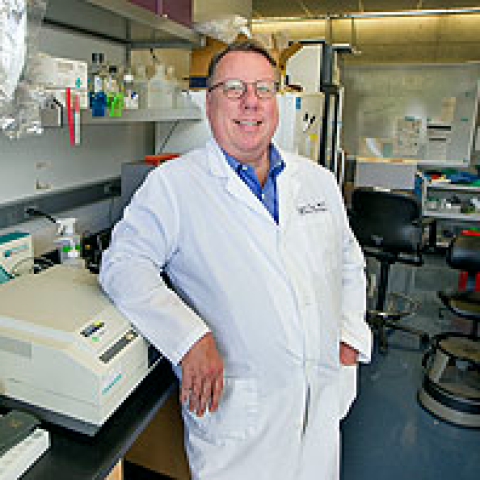Interdisciplinary Initiatives Program Round 8 - 2016
James Ford, Medicine (Oncology) and Genetics
Sanjay Malhotra, Radiation Oncology
Individuals with inherited BRCA1 mutations have a high risk for several cancers, including breast and ovarian cancer in women. Although screening can help identify cancers early when they are potentially more curable, this approach is imperfect. Therefore, there is an urgent need to identify ways to prevent cancer in this high risk population. Oxidative stress is a major source of normal DNA damage to our DNA, and is thought to contribute to cancer development and progression. We have previously shown that cells with mutant BRCA1 are deficient in the DNA repair pathway that targets oxidative DNA damage, termed Base Excision Repair (BER).
We performed a high-throughput screen to identify small molecules that enhance or “activate” the deficient base-excision DNA repair observed in BRCA1-mutant breast cancer cell lines. Amongst a variety of validated “hits” is benserazide, a currently known and clinically used decarboxylase inhibitor approved for clinical use in Canada and the UK in combination with L-Dopa for Parkinson’s disease, and acetohexamide, a drug used to treat diabetes for decades. Our pre-clinical cell line and mouse studies have shown that clinically achievable doses of this drug enhance DNA repair and prevent BRCA1-associated cancer development and progression, presumably through a mechanism independent of their primary targets. Overall, DNA repair-activating agents target a defect specific to BRCA1-mutated cells, possess characteristics ideal for chemoprevention, and thus, may be used to prevent or delay the development of breast and ovarian cancer in carriers of BRCA1 mutations.
In this project, we propose to collaborate to develop a series of chemically related compounds to our initial hits, in order to identify compounds with greater activity and less off-target effects and toxicity. Drugs will be tested in our cell line and mouse models for activity in enhancing repair of oxidative DNA lesions in BRCA1 mutant cells and preventing tumorigenesis. Leads compounds resulting from this structure-function analysis will be excellent candidates to consider for trials in BRCA1 mutation carriers to prevent cancer.
This is an excellent collaborate project for support from Bio-X, in that it involved faculty PIs from the clinical sciences (oncology, genetics) and chemical biology, to combine knowledge in drug synthesis, pharmacokinetics and chemistry, with mechanism based biology of cancer susceptibility.


